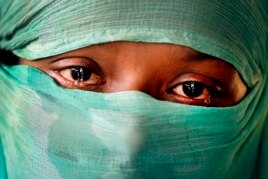11 December, 2017
A new report uses words like "sweeping" and "methodical" to describe sexual violence against Rohingya Muslims by members of Myanmar's security forces.
Reporters with the Associated Press spoke with 29 women and girls who fled to Bangladesh from Myanmar. The youngest girl they spoke to was just 13 years old; the oldest woman was 35.
One of the women in the report wanted to be identified as "F", the first letter in her name. She told the AP that, one night in June, a group of soldiers entered her home as she and her husband slept.

In this Wednesday, Nov. 22, 2017, photo, F, 22, who says she was raped by members of Myanmar's armed forces in June and again in September, is photographed in her tent in Kutupalong refugee camp in Bangladesh.
Just days before, F found out that security forces had killed her parents. This time, she said, the solders had come for her.
First, the men tied her husband up with a rope. They removed her headscarf and tied it around the husband's mouth.
Then, they threw her on the floor and one of the soldiers raped her. She struggled against him, but other soldiers held her down. She watched in fear as another soldier shot her husband in the chest. Another cut his throat.
"Sickening sameness"
Associated Press reporters found what they called a "sickening sameness" among the descriptions from the women and girls. Each one said she was raped by a group of men. All but one woman said her rapists wore clothes like those worn by Myanmar's armed forces.
The woman who said her attackers wore plain clothing said that her neighbors recognized the men as working at a local military base.
Many of the women said the attackers' uniforms had either a star or arrows on them. The AP said those markings "represent the different units of Myanmar's army."
The attacks took place between October 2016 and the middle of September in Rakhine state, the AP reported.
The news agency said doctors and aid workers are shocked by the number of rapes, but "suspect only a fraction of women have come forward."
The group Doctors Without Borders told the AP that its medical workers have treated 113 sexual violence survivors since August. It said that one-third of the survivors were under 18. The youngest survivor they have treated was nine years old.
Crystal van Leeuwen is an official with Doctors Without Borders. She told the AP, "The stories that they are telling us, and not only the victims themselves, but that other people are telling us about witnessing acts of sexual violence in Myanmar, make us feel that we're only capturing a very small proportion of the victims."
The women's stories support the United Nations' belief that armed forces are systematically using rape as a 'calculated tool of terror' against the Rohingya people, the AP said.
It also said Myanmar's security forces refused several requests for comment. The news agency said the military carried out an internal investigation in November and ruled that none of the assaults ever took place.
International reaction to Rohingya crisis
Aung San Suu Kyi, Myanmar's civil leader, has come under criticism from the international community. Some officials say has her reaction to the Rohingya crisis has been too slow.
The Nobel Peace Prize winner has said there has been "a huge iceberg of misinformation" about the issue.
The Rohingya Muslim minority have been denied citizenship and other rights in Myanmar, a Buddhist-majority country. It considers them to be immigrants from Bangladesh. However, many Rohingya families have lived in Myanmar for generations.
Myanmar's military has been accused of launching a scorched earth campaign against Rohingya villages. Military officials say the campaign is in response to attacks on police by Rohingya militants in August.
Since then, 600,000 people have fled from Myanmar to Bangladesh. Some of the refugees have told rights groups of shootings, rapes and violent attacks by government security forces. They also accuse the security forces of setting fires to villages.
The U.N. has described the reported actions carried out by Myanmar forces as "a textbook case of ethnic cleansing."
I'm Ashley Thompson
I'm Jonathan Evans.
Fern Robinson reported on this Associated Press story for VOANews. George Grow adapted her report for Learning English. Ashley Thompson was the editor.
We want to hear from you. Write to us in the Comments Section.
______________________________________________________________
Words in This Story
sweeping – adj. moving over a wide area; extensive
headscarf – n. a cloth worn over the head
unit – n. a thing or group that is part of a larger organization
fraction – n. percentage
iceberg – n. a large piece of ice floating in the ocean
scorched earth – adj. related to a military policy involving widespread destruction of property
response – n. a reaction to something
ethnic cleansing – n. the expulsion, jailing or killing of an ethnic minority by a majority population
persecuted – adj. oppressed or repressed